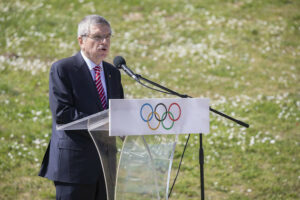RRW: Rescheduling Olympic Games Like “A Huge Jigsaw Puzzle” Says Thomas Bach
By David Monti, @d9monti
(c) 2020 Race Results Weekly, all rights reserved
(26-Mar) — It’s like the classic question in physics: What happens when an unstoppable force collides with an immovable object?
 IOC president Thomas Bach attends the lighting of the flame ceremony held in Ancient Olympia Greece on March 12 (photo by Greg Martin/IOC; used with permission)
IOC president Thomas Bach attends the lighting of the flame ceremony held in Ancient Olympia Greece on March 12 (photo by Greg Martin/IOC; used with permission)
That’s essentially the situation International Olympic Committee (IOC) president Thomas Bach faced last Sunday when he saw the grave updates from the World Health Organization on the spread of COVID19 and knew that the Tokyo 2020 Olympics, nearly a decade in the making, could not take place safely as scheduled. Something had to give.
“This situation changed very rapidly,” Bach told reporters on a conference call yesterday. He continued: “When we saw this on Sunday morning, I called an emergency meeting of the IOC executive board with the aim to open a discussion with our Japanese hosts, partners and friends to start opening a discussion about the postponement of the Games.”
Bach said that the IOC, local organizing committee, and the Japanese government quickly agreed that postponement was the only option. The announcement came Tuesday that the Games would not be held as scheduled, but that was only the beginning of a complicated process to find a new range of dates for the Games which would work for 33 different sports federations and over 11,000 athletes.
“This is like a huge jigsaw puzzle putting together and every piece has to fit,” Bach told reporters somberly. “If you take out one piece, the whole puzzle is destroyed. Therefore, everything has to come together, and everything is important.”
A task force, called “Here We Go” was established by the IOC to hammer out the details of the rescheduled Games, a gargantuan task which touches every facet of sports business including broadcast and media, sponsorship, logistics, event schedules, coaching, officiating, national and international governing bodies, ticketing, lodging, and facility construction and maintenance.
“They are now looking into it,” Bach said of the task force. “We have to see with them what the options are. We have to take into account the sports calendar around the Olympic Games and many other issues.”
Bach did not offer a timetable for any decisions, but stressed that they had to get it right.
“We should come to a solution as soon as possible, but the first priority there should be the quality of the decision,” he said. He added: “This is why I really do not envy the members of this task force in their work. But, having seen the proof of their professionalism, the dedication of the organizing committee which made Tokyo the best-prepared Olympic city ever, and knowing about the professionalism of our coordination commission and our Olympic Games department I’m really confident that we can also master this first-ever challenge.”
Most observers assume that the Games will be postponed a full year providing enough time for the COVID19 threat to subside and all Olympic sports to modify their annual event schedules. For athletics, the World Athletics Championships scheduled for Eugene, Ore. a year from August, would have to be moved, probably to 2022. However, a 2022 World Championships would conflict with both the European Athletics Championships (Munich, August 11 – 21) and the Commonwealth Games (Birmingham, July 27 – August 7).
Bach sounded both confident and cautious.
“The games have never been postponed before,” he said. “We have no blueprint.”






